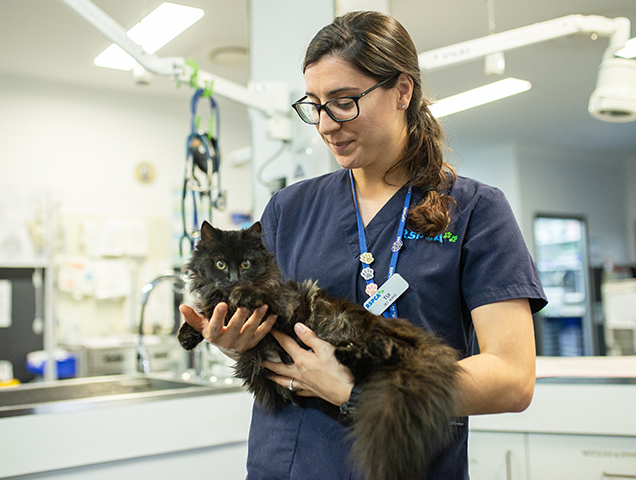Rohan says, “You do need to find a clinic that’s willing to take you on for the practical component of the course so it’s a good idea to put feelers out early, ‘cos it can take a long time to find a placement.
“I worked at the RSPCA while I was completing (the certificate IV) so that worked really well for me, and it works well for a lot of people. We’re starting to see a few more people do the Veterinary Technology course and we’ve got probably an even mixture at the moment,” Rohan says.

Above: Vet Nurse Tui assisting Nerfy, the cat that required surgery after eating a toy bullet
As a Vet Nurse, her job involves taking on many different roles across all stages of an animal’s care. Rohan explains. “Our days start with a handover from the night nurse and after that, we take a walk through all the wards to check on the patients. There is always some cleaning to do early morning to ensure the patients are clean and comfortable. Throughout the day, we will monitor the patients, assist the vet to examine and medicate the patients, and attend to nursing cares… As well as this, there are animals to prepare for foster, phones to answer, files to update, new patients to triage and so much more. It's always a busy day!”
Being a veterinary nurse is a hectic job. Not every day is the same and not every animal story has a happy ending, but Rohan says that knowing she’s making a difference for the animals in her care, makes it all worth it.
“Obviously when you lose a patient or an owner brings in their beloved pet to put to sleep that’s really hard, and there’s an awful lot of cleaning, but definitely more good than bad for sure,” Rohan says.
“The best bit is definitely having the contact with the animals every single day. You see animals in distress and then you can help them, there’s not a day where you go home and say ‘oh that was really boring’.
“You go home exhausted but you go home and you go into bed at night and think I helped that animal. You feel like you’re making a difference.”

Above: Rehab is one part of the veterinary nursing role with pets recovering from orthopedic surgery.
The important attributes for any prospective vet nurse to develop is the ability to multitask, and well developed animal handling skills, Rohan says.
Rohan suggests, “Volunteer somewhere like the RSPCA where you can really develop your skills, because you need to have really good animal handling skills and over a range - so dogs, cats, horses and all sorts, the more the better.”
Keep an eye on our website for volunteer positions within the RSPCA veterinary teams and paid positions here.







